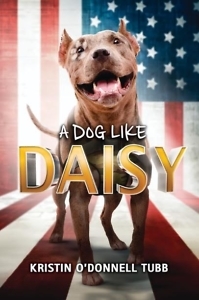Does your dog really like it when you talk in a high-pitched, baby voice? Would your cat prefer to be left under the bed instead of indulging your after-work cuddle routine? Science offers few definitive answers, but where science falters, fiction is happy to fill in. Kristin O’Donnell Tubb’s new middle-grade novel, A Dog Like Daisy, explores one dog’s life, from her traumatic past to her turbulent present, in a first-person narrative about the healing power of pets—from the pet’s point of view.
 From the very start, it’s clear that this novel is a cross-species marvel of empathy, for Tubb gives Daisy a completely convincing internal narrative. This hyper-intelligent canine’s first concern is simply survival: dogs in the shelter get “fourteen sunrises before they must go through the door to the Bad Side,” and Daisy only has two sunrises left. Luckily, she is chosen by a family whose “pack leader” is Colonel Victor, a veteran struggling to overcome PTSD. Daisy, a pit-bull mix, has physical and mental scars of her own, but Colonel Victor sees something in her that makes him believe she can become a bona fide service dog.
From the very start, it’s clear that this novel is a cross-species marvel of empathy, for Tubb gives Daisy a completely convincing internal narrative. This hyper-intelligent canine’s first concern is simply survival: dogs in the shelter get “fourteen sunrises before they must go through the door to the Bad Side,” and Daisy only has two sunrises left. Luckily, she is chosen by a family whose “pack leader” is Colonel Victor, a veteran struggling to overcome PTSD. Daisy, a pit-bull mix, has physical and mental scars of her own, but Colonel Victor sees something in her that makes him believe she can become a bona fide service dog.
Daisy’s troubles are nowhere close to over, however: she must master the training to become a certified service dog in only six weeks or return to the shelter. Once a freely roaming feral dog, Daisy will be leashed for the next thirty days with only the Colonel to care for her. No friendly pats from other family members, no trips to the park, no rolling around in trash—Daisy’s only hope of becoming a part of the pack lies in learning to deny her own natural impulses and attend to Colonel Victor’s, even as his problems force her to confront her own.
The fictional narrative of A Dog Like Daisy tracks the experience of real-life military families working to overcome the effects of PTSD. The thirty-day bonding period between dog and veteran, the rigorous tests, and the many sleepless nights are all realities for veterans who have experienced trauma. In writing this book, Tubb spoke to animal trainers and families of veterans who had service dogs of their own, and this novel will raise awareness of the problems faced by those who are learning to return to life after war. Many soldiers continue to fight on in their minds even after they come home from overseas; through Daisy, Tubb manages to balance this dark reality with humor and empathy.
 In an author’s note, Tubb writes, “It is also believed that dogs experience multiple senses simultaneously, like a human with synesthesia might.” This mixing of sensory details is one of the most charming parts of A Dog Like Daisy. “Surprise tastes like cinnamon”; “Nervousness tastes like pigeon feathers”; and “Doubt tastes like heartworm medicine” are just a few of the delightful multisensory details Tubb uses to represent life from Daisy’s point of view.
In an author’s note, Tubb writes, “It is also believed that dogs experience multiple senses simultaneously, like a human with synesthesia might.” This mixing of sensory details is one of the most charming parts of A Dog Like Daisy. “Surprise tastes like cinnamon”; “Nervousness tastes like pigeon feathers”; and “Doubt tastes like heartworm medicine” are just a few of the delightful multisensory details Tubb uses to represent life from Daisy’s point of view.
Such details are particularly poignant during episodes of emotional turmoil. When Daisy senses that something dangerous is coming for Colonel Victor, she identifies it by taste: “The taste of danger is thick on my tongue: meat with maggots.” When she’s unable to interrupt a flashback for Victor, he recovers by sleeping for a few days, leaving Daisy with no one to pet her, feed her, or take her to the bathroom: “Loneliness tastes like water from the cold toilet bowl,” she thinks.
The emotional journey of veterans experiencing PTSD is a difficult subject, and this book explores it with empathy and candor. The commitment of these characters—human and canine—to confront their past and find freedom in the future offers an inspiring example of personal resilience, and young readers will also discover healthy ways to come to terms with anger, grief, and confusion. Readers of all ages will find themselves rooting for Daisy when they get their paws on this engaging novel.

Sarah Carter is a high-school English teacher living and working in Lebanon, Tennessee. She is currently an M.F.A. candidate at the Sewanee School of Letters.





